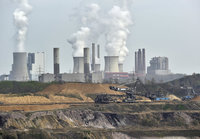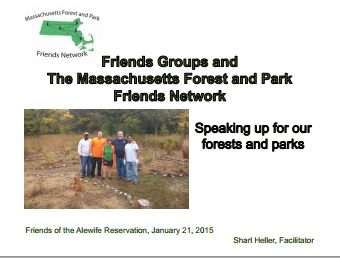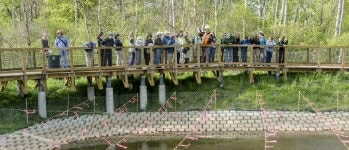U.N. Panel Warns of Dire Effects From Lack of Action Over Global Warming

Machines digging for brown coal in front of a power plant near Grevenbroich, Germany, in April. Credit Martin Meissner/Associated Press
By JUSTIN GILLIS | NOV. 2, 2014
COPENHAGEN — The gathering risks of climate change are so profound they could stall or even reverse generations of progress against poverty and hunger if greenhouse gas emissions continue at a runaway pace, according to a major new United Nations report.
Despite rising efforts in many countries to tackle the problem, the overall global situation is growing more acute as developing countries join the West in burning huge amounts of fossil fuels, the Intergovernmental Panel on Climate Change said here on Sunday.
Failure to reduce emissions, the group of scientists and other experts found, could threaten society with food shortages, refugee crises, the flooding of major cities and entire island nations, the mass extinction of plants and animals, and a climate so drastically altered it might become dangerous for people to work or play outside during the hottest times of the year.
“Continued emission of greenhouse gases will cause further warming and long-lasting changes in all components of the climate system, increasing the likelihood of severe, pervasive and irreversible impacts for people and ecosystems,” the report declared.
In the starkest language it has ever used, the expert panel made clear how far society remains from having any serious policy to limit global warming.
Doing so would require finding a way to leave the vast majority of the world’s reserves of fossil fuels in the ground, or, alternatively, developing methods to capture and bury the emissions resulting from their use, the group said.
If governments are to meet their own stated goal of limiting the warming of the planet to no more than 3.6 degrees Fahrenheit, or 2 degrees Celsius, above the preindustrial level, they must restrict emissions from additional fossil-fuel burning to about 1 trillion tons of carbon dioxide, the panel said.
At current growth rates, that budget is likely to be exhausted in something like 30 years. Yet energy companies have already booked coal and petroleum reserves equal to several times that amount, and they are spending some $600 billion a year to find more. Utilities and oil companies are still building coal-fired power plants and refineries, and governments are spending another $600 billion directly subsidizing the consumption of fossil fuels.
By contrast, the report found, less than $400 billion a year is being spent around the world to reduce emissions or otherwise cope with climate change. That sum is smaller than the revenue of a single American oil company, ExxonMobil.
The new report comes just a month before international delegates convene in Lima, Peru, in an effort to devise a new global treaty or other agreement to limit emissions, and it makes clear the urgency of their task.
Appearing at a news conference in Copenhagen Sunday morning to unveil the report, the United Nations secretary general, Ban Ki-moon, issued an urgent appeal for strong action in Lima.
“Science has spoken. There is no ambiguity in their message,” Mr. Ban declared. “Leaders must act. Time is not on our side.”
Yet there has been no sign that national leaders are willing to discuss allocating the trillion-ton emissions budget among countries, an approach that would raise political and moral questions of fairness. On the contrary: They are moving toward a relatively weak agreement that would essentially let each country decide for itself how much effort to put into limiting global warming, and even that document would not take effect until 2020.
“If they choose not to talk about the carbon budget, they’re choosing not to address the problem of climate change,” said Myles R. Allen, a scientist at Oxford University in Britain who helped write the new report. “They might as well not bother to turn up for these meetings.”
The Intergovernmental Panel on Climate Change is a scientific body appointed by the world’s governments to advise them on the causes and effects of global warming, and potential solutions. The group was awarded the Nobel Peace Prize in 2007, along with Al Gore, for its efforts to call attention to the climate crisis.
The new report is a 175-page synopsis of a much longer series of reports that the panel has issued over the past year, culminating a five-year effort by the body to summarize a vast archive of published climate research.
It is the fifth such report from the group since 1990, each finding greater certainty that the climate is warming and that human activities are the primary cause.
“Human influence has been detected in warming of the atmosphere and the ocean, in changes in the global water cycle, in reductions in snow and ice, and in global mean sea-level rise; and it is extremely likely to have been the dominant cause of the observed warming since the mid-20th century,” the report said.
A core finding of the new report is that climate change is no longer a distant, future threat, but is being felt all over the world already.
“It’s here and now,” said Rajendra K. Pachauri, the chairman of the panel, in an interview. “It’s not something in the future.”
The group cited mass die-offs of forests, including those in the American West; the melting of land ice virtually everywhere in the world; an accelerating rise of the seas that is leading to increased coastal flooding; and heat waves that have devastated crops and killed tens of thousands of people.
The report contained the group’s most explicit warning yet about the food supply, saying that climate change had already become a small drag on overall global production, and could become a far larger one if emissions continued unchecked. The reported noted that in recent years the world’s food system had shown signs of instability, with sudden price increases leading to riots and, in a few cases, the collapse of governments.
A related finding is that climate change poses serious risks to basic human progress in areas such as alleviating poverty. Under the worst-case scenarios, factors like high food prices and intensified weather disasters would most likely leave poor people worse off. In fact, the report said, that has already happened to a degree.
In Washington, the Obama administration welcomed the new report, with the president’s science adviser, John P. Holdren, calling it “yet another wake-up call to the global community that we must act together swiftly and aggressively in order to stem climate change and avoid its worst impacts.”
The administration is pushing for new limits on emissions from American power plants, but faces stiff resistance in Congress and some states.
Michael Oppenheimer, a climate scientist at Princeton University and a principal author of the new report, said that a continuation of the political paralysis on emissions would leave society depending largely on luck.
If the level of greenhouse gases were to continue rising at a rapid pace over coming decades, severe effects could be headed off only if the climate turned out to be much less sensitive to those gases than most scientists think is likely, he said.
“We’ve seen many governments delay and delay and delay on implementing comprehensive emissions cuts,” Dr. Oppenheimer said. “So the need for a lot of luck looms larger and larger. Personally, I think it’s a slim reed to lean on for the fate of the planet.”
Article preserved 2014-11-02 from http://www.nytimes.com/2014/11/03/world/europe/global-warming-un-intergovernmental-panel-on-climate-change.html?emc=eta1&_r=0
- Home
- Directions
- FAR Wildlife Blog
- Calendar
- News
- Donate Now
- Get Social!
- Storm Water Wetlands
- Plants and Restoration
- Photos
- Videos
- About & Projects
- Master Plan for Alewife
- Archive
- Newsletters
- Contact
 Presentation Spotlighting Alewife Reservation
Presentation Spotlighting Alewife Reservation
 Follow us on Twitter
Follow us on Twitter
 Like us on Facebook
Like us on Facebook
 Follow us on Instagram
Follow us on Instagram
Forward our web address to a friend!
- An Urban Gem - Alewife Reservation Nature Preserve
- Envisioning The Silver Maple Forest
- History and Policies of Cambridge, Belmont, and DEP
- Storm Water Wetlands
- Friends of Alewife Reservation brochure
(front, back) - Technical Analysis of Upper Alewife Basin
- Watershed: An Excursion in Four Parts
- The River Is A Restless Spirit: Life in the floodplain forest
-
Assessment of Silver Maple forest for DEP Adjudicatory hearings and
Patrick Fairbairn, author of the Assessment - Community Native Garden Flora
The
Alewife Reservation
is a unique natural resource for the communities of Belmont, Arlington and Cambridge
and home to hundreds of species, including hawks, coyotes beavers, snapping turtles, wild turkeys and muskrats,
the reservation is a unique natural resource for the community.
Historical information (Powerpoint)
Friends of Alewife Reservation works to protect and restore this wild area and the surrounding area for the water quality, native plants, animals and over 90 bird species with paths for walking, running and biking, recreation, and for classroom education and research. We regularly steward and preserve the Reservation area for wildlife and for the enjoyment of present and future generations.

(video)
By-Laws
About Friends of Alewife Reservation
Statement of Purpose
Citizen Forester newsletter archive
The Birds of the Cambridge Region of Massachusetts

by William Brewster 1906
Nuttal Ornithological Society
Biodiversity Study of Alewife Reservation Area: Species, Habitat, Ecosystems

Inventories by David Brown, wildlife assessor (2003, 2004.) Published by and available from FAR for $10. Write or call for your copy. (sample)
Updated Dave Brown Inventories (2008, 2010)
Inventories of Alewife Reservation Wetland Plants by Walter Kittredge, Botanist (2013)

